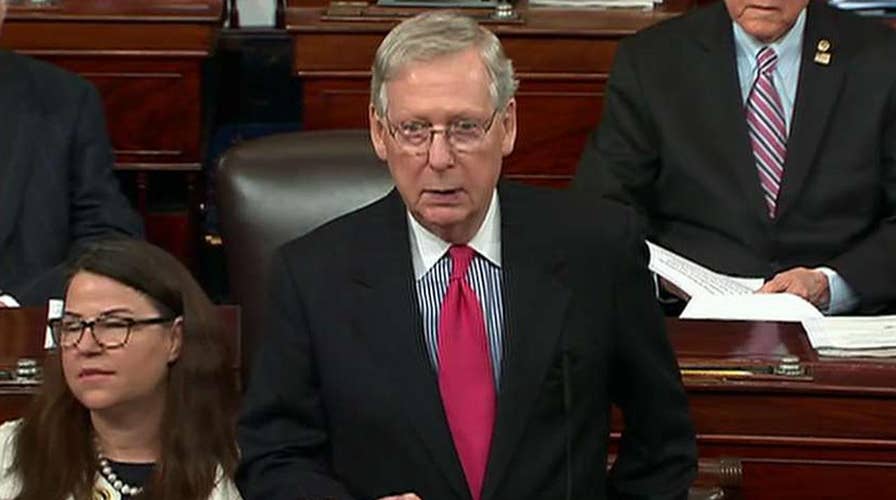Sen. McConnell invokes 'nuclear option' for Gorsuch vote
Chief congressional correspondent Mike Emanuel reports from Capitol Hill
Senate Republicans deployed the so-called “nuclear option” Thursday in their drive to confirm Judge Neil Gorsuch to the Supreme Court, dramatically changing the way the Senate does business in order to overcome a Democratic filibuster.
In a fast-paced chain of events that clears the way for Gorsuch to be confirmed by Friday morning, majority Republicans changed Senate precedent so that a high court nominee can advance to a final vote with a simple majority of 51 senators, as opposed to 60.
By Senate standards, this was ground-shaking.
Majority Leader Mitch McConnell, R-Ky., declared he did so to “restore norms” and get past what he called an “unprecedented” Democratic filibuster.
Minority Leader Chuck Schumer, D-N.Y., countered that the changes could send the Senate and the nomination process “over the cliff.”
Republicans succeeded in making the change on a party-line vote Thursday afternoon. The body then swiftly took another, 55-45 vote to end debate and tee up a final confirmation vote expected at 11:30 a.m. ET Friday.
This was after Democrats initially blocked Gorsuch in a filibuster earlier in the day. Four Democrats broke ranks -- Sens. Michael Bennet, D-Colo.; Heidi Heitkamp, D-N.D.; Joe Donnelly, D-Ind.; and Joe Manchin, D-W.Va. – but Republicans still fell short of the 60 votes needed to proceed, prompting McConnell to overhaul the way the Senate works.
He said he did so “for the sake of our country.”
Bennet later opposed Gorsuch on the do-over vote.
While congressional Republicans and President Trump are now virtually guaranteed to get Gorsuch on the high court, the impact of the events that played out Thursday could be felt for years, if not decades, to come. Each party blamed the other for the escalation and the breakdown in the Senate’s parliamentary decorum.
Indeed, McConnell’s predecessor as Senate majority leader Harry Reid, now retired, took the first step down the “nuclear” road by lowering the threshold for other nominees in 2013 – a controversial move Republicans frequently brought up on the road to Thursday’s proceedings.
But lowering the threshold for a Supreme Court pick is a more significant step. It means for the foreseeable future, the minority party will have significantly less leverage to oppose any nominee to the highest court in the land, no matter who is president.
Schumer said there will be “less faith in the Supreme Court” going forward.
McConnell, kicking off Thursday’s session, blasted Democrats for the filibuster attempt and accused them of driving the upper chamber to this point. He said their opposition to Gorsuch isn’t about the nominee but “the man who nominated him” – and part of an “extreme escalation in the left’s never-ending drive to politicize the courts and the confirmation process.”
Republicans say Democrats have been unfair to an otherwise eminently qualified nominee and have wrongly cast him as an ideologue.
However, despite exhaustive confirmation hearings where Gorsuch, like many nominees before him, declined to take clear stances on hot-button issues, Democrats largely are convinced he would be a staunch conservative in the mold of the late Antonin Scalia, whose seat he would fill on the nine-member court. They pointed to past rulings on cases where he sided with businesses against workers, though his allies maintain he was merely applying the law as written. Democrats also are still furious over Republicans’ refusal to consider former President Barack Obama’s nominee, Merrick Garland.
Democrats, meanwhile, howled over the GOP majority’s move to deploy the “nuclear option” to get Gorsuch approved in the end. They warn it will drastically change the way the Senate operates for the worse.
“It doesn’t have to be this way,” Schumer said. “The answer is not to change the rules, it’s to change the nominee.”
He also said Gorsuch “may very well turn out to be one of the most conservative justices on the bench.”
The actual deployment of the nuclear option was cloaked in obscure parliamentary-speak.
McConnell, after the initial Democratic filibuster, asked for a simple majority vote “on all nominations.”
The presiding officer said the point of order was not sustained. McConnell, with seven fateful words, said: “I appeal the ruling of the chair.”
His party backed him, eliminating the 60-vote requirement for Supreme Court nominees.
Fox News’ Chad Pergram contributed to this report.













































